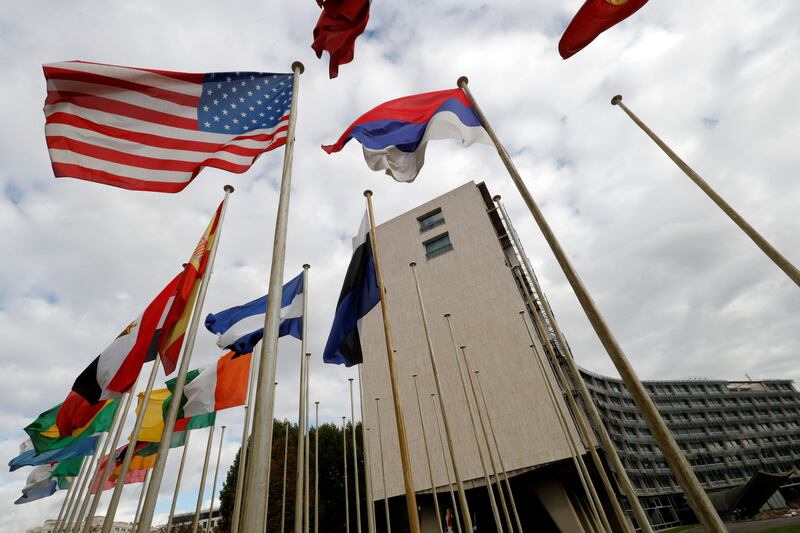The United States is withdrawing from UNESCO, the state department said on Thursday, accusing the United Nations' cultural and educational agency of bias against Israel.
Within hours, Israel announced it was following suit.
The US state department said is decision was based on "the need for fundamental reform in the organisation, and continuing anti-Israel bias at UNESCO." However, the US hopes to remain engaged as a permanent observer in order to contribute American views.
America's departure deals a further blow to an organisation beset by regional rivalries, accusations of inefficiency and a lack of funds and comes as UNESCO is due to choose a new chief this week in a bid to revive its fortunes.
The head of UNESCO, Irina Bokova, expressed "profound regret" over the decision.
The withdrawal will take effect on December 31, 2018. Until then, the US will remain a full member of UNESCO.
_________________________
Read more:
UAE pledges Dh55m for heritage site protection fund
Top 5 new World Heritage Sites to visit in 2017
Interpol approves membership for state of Palestine
_________________________
The US contributed about US$80 million (Dh293.8m) a year to UNESCO, accounting for around a fifth of its budget, but cancelled its contribution in 2011 in protest at the Palestinians being granted full membership. But it kept its vote on the executive board.
A few hours after the state department announcement, Israel's prime minister Benjamin Netanyahu declared he was also pulling Israel out of UNESCO. Israel has also long been at loggerheads with UNESCO, particularly over the decision to admit the Palestinians as members in 2011.
In July, the UN body declared the Old City of Hebron in the occupied West Bank an endangered World Heritage site, delighting Palestinians and infuriating Israel. Mr Netanyahu retaliated by announcing a $1-million cut in funding to the United Nations, saying the UNESCO vote ignored Jewish ties to the site.
Mr Netanyahu said he welcomed President Donald Trump's "courageous and moral decision because UNESCO has become the theatre of the absurd and because instead of preserving history it distorts it."
The Paris-based agency, which began work in 1946, is known for designating World Heritage sites such as the ancient city of Palmyra in Syria and the oasis in Al Ain, the UAE's first World Heritage site. President Trump has in general been highly critical of the United Nations, complaining about how much it costs and questioning whether some of the UN-affiliated institutions give value for money.
The US state department said the decision “was not taken lightly” and gave three reasons for it: concerns over mounting arrears at UNESCO, the need for "fundamental reform and "continuing anti-Israel bias."
The decision is being perceived as another indication of increasing isolationism in the US. Former US assistant secretary of State Philip Crowley, called the decision “yet another step back by the Trump administration from America's leadership role.”
Mr Crowley told The National, “While in the greater scheme of things, UNESCO is a small international organisation … this move together with the withdrawal from Trans-Pacific Partnership (TPP) and the Paris agreement makes it clear the United States is retreating from the world and becoming more self-absorbed under the Trump administration.”
Daniel Serwer, another former state department official who is now at the Middle East Institute, recalled the US leaving UNESCO once before, in 1984-2002, under the Reagan administration because of perceived pro-Soviet bias.
"I don't know anyone who thinks that served our national interests,” Mr Serwer said. "We are now withdrawing again because we owe the organisation millions in arrears. UNESCO will survive.. The US will survive.” The bigger impact would be the "decline of American influence, which seems to be the Trump Administration's main objective this week.”
Unesco's commitment to media freedom contradicts President Trump's recently tweeted threats to challenge and "if appropriate” revoke media licenses.
Richard Gowen of the European Council on foreign relations, saw the decision as “just gesture politics because the US is already semi-detached from Unesco." He said it allowed Mr Trump to “look tough on the UN”, but could backfire badly by giving China and other powers reasons to claim the US is walking away from global leadership.
The loss of two contributing nations will pose an immediate challenge to whoever becomes Unesco's new chief. On Wednesday, France and Qatar were running neck-and-neck in the race after a third round of voting whittled the field down to five.
After three days of secret balloting that could run until Friday, Qatar's Hamad bin Abdulaziz Al Kawari and France's Audrey Azoulay are tied to win the top post at the organisation, with Egyptian hopeful Moushira Khattab in third.
Mr Al Kawari and Ms Azoulay, both former culture ministers, had 18 votes apiece in the battle to replace outgoing UNESCO director-general Irina Bokova, according to results posted on Unesco's website. Behind them in the secret ballot was Egyptian career diplomat Moushira Khattab with 13 votes and China's Tang Qian with five.
Thirty votes are needed to clinch the nomination to head the agency. The winner must then be approved by Unesco's 195 member states in November, though this is seen as a formality.
If no candidate wins an outright majority after Thursday's fourth round, however, it goes to a run-off between the top two.
Most of the candidates acknowledge the need to reform the 71-year-old organisation whose bloated bureaucracy is accused of inefficiency.
While the granting of full membership to Palestine in 2011 infuriated the US and Israel, Arab countries have complained that the agency has never had a chief from their region.






